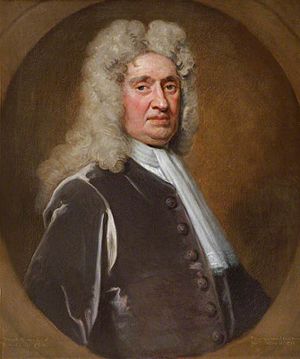Denzil Onslow of Pyrford facts for kids
Denzil Onslow of Pyrford (born around 1642 – died June 27, 1721) was a British politician. He was a member of the Whig party. He served in the English and later British Parliament from 1679 until 1721. Denzil became rich and important in the Surrey area through smart marriages. His family was very influential in politics.
Contents
Early Life and How He Became Wealthy
Denzil Onslow was the sixth son of Sir Richard Onslow. Because he had many brothers, he did not inherit much money from his father. He was named after Denzil Holles, who was his godfather.
Denzil decided to make his own fortune. His older brother, Arthur, married a rich woman named Mary Foote. Denzil then married Mary's sister, Sarah Lewis. Sarah was a widow and had a lot of money. This money allowed Denzil to buy a large estate called Pyrford in Surrey in 1677. He also bought another estate called Wisley.
Rising in Surrey Politics
Denzil worked hard to improve his new estates. His wealth grew even more when his father-in-law, Sir Thomas Foote, died in 1688. Sir Thomas's money was split between Denzil's wife, Sarah, and her sister, Mary. This made Denzil's income rise to about £2,000 a year.
As Denzil became richer and more important, he wanted to get into politics. He found his chance during a big political debate in 1679. This debate was about whether James II of England should be allowed to become king. Denzil supported the idea of stopping James II. He became a Member of Parliament (MP) for Haslemere. An MP is a person elected to represent an area in Parliament.
At the same time, his brother Arthur became an MP for the whole county of Surrey. His nephew, Richard, became an MP for Guildford. This shows how powerful the Onslow family was in Surrey politics. Denzil had a tough fight for his seat, but he won in November 1680.
Denzil's Time in Parliament
Denzil lost his MP seat in 1681. Around 1686, he got a new job called "outranger of Windsor Forest." This job gave the Onslow family more power in western Surrey. It also paid Denzil £600 a year.
In 1689, after a big change in government called the Glorious Revolution, Denzil got his seat back in Parliament for Haslemere. He was a strong supporter of the Whig party. The Whigs were a political group that believed in limiting the power of the king.
In 1695, Denzil ran for MP of Surrey alongside his nephew, Sir Richard. They won, but it was a very close election. Denzil's votes showed he was a loyal Whig, even though he didn't always attend Parliament regularly.
He returned to Parliament in February 1701 as an MP for Guildford. He was a reliable supporter of the Whigs. In 1706, he was given a job as a "commissioner of victualling," which paid him £400 a year. This job involved making sure the navy had enough food and supplies.
Later Years and Legacy
Denzil continued to work for the Whig party. Even when he lost some of his jobs in 1711, he stayed loyal to his party. His nephew, Sir Richard, also became an MP again.
In 1714, Denzil returned to Parliament as an MP for Guildford. The Whig party became more powerful under the new king, George I. Because of this, Denzil got his job as commissioner of victualling back.
In 1717, his nephew Richard died. To keep the family's power in Surrey, Denzil arranged to get his old job, "Out-Ranger of Windsor Forest," back. This job was considered an "office of profit" under the Crown. This meant he had to leave his seat as MP for Guildford. He then ran for MP of Surrey and won. This was one of the first times someone used such a job to switch their MP seat.
Denzil Onslow died four years later, in 1721. He had no children. He left his estates to the children of his nephew, Richard Onslow.
 | Emma Amos |
 | Edward Mitchell Bannister |
 | Larry D. Alexander |
 | Ernie Barnes |


